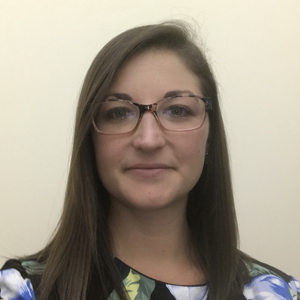Alumni Story
Elizabeth Spehalski, PhD
Pharmacologist in the Department of Hematology and Oncology Products in the Office of New Drugs, Food and Drug Administration
 Spehalski
It is so important to have advocates for science in as many places as we can,” said Spehalski, as we discussed her time in the Molecular and Cellular Pathology Graduate Program at the University of Michigan. Spehalski did not follow the “expected” path to academics, that so many graduate programs are geared toward. Instead, she pursued a path that took her to the Food and Drug Administration (FDA). Choosing the MCP Program at Michigan enabled her to prepare for her career. “I received excellent laboratory training in the MCP Graduate Program. I also think that the opportunities I was given to practice giving presentations were invaluable. Finally, during my time as a graduate student, MCP allowed us to form a graduate student group that brought in speakers from "alternative career paths." This became very important for my career path, as I learned that less than 20% of science PhDs go on to a professorship. It allowed me to expand my view of the doors that having a PhD could open,” she explained.
Spehalski
It is so important to have advocates for science in as many places as we can,” said Spehalski, as we discussed her time in the Molecular and Cellular Pathology Graduate Program at the University of Michigan. Spehalski did not follow the “expected” path to academics, that so many graduate programs are geared toward. Instead, she pursued a path that took her to the Food and Drug Administration (FDA). Choosing the MCP Program at Michigan enabled her to prepare for her career. “I received excellent laboratory training in the MCP Graduate Program. I also think that the opportunities I was given to practice giving presentations were invaluable. Finally, during my time as a graduate student, MCP allowed us to form a graduate student group that brought in speakers from "alternative career paths." This became very important for my career path, as I learned that less than 20% of science PhDs go on to a professorship. It allowed me to expand my view of the doors that having a PhD could open,” she explained.
When considering which graduate program to choose, Spehalski selected the University of Michigan’s Program in Biomedical Sciences (PIBS) due to the value of the research being conducted in the program. From there, she selected the Molecular and Pathology Graduate Program. “I liked that the department was on the smaller side” she said. “The small size allowed the faculty and students to interact in a more intimate way that fostered a great system of support and mentorship. Second, I was drawn to MCP because many of the faculty had ties to the clinic, which I thought could be a valuable resource."
Once the program was selected, it was time to choose a mentor. Spehalski selected Dr. David Ferguson. "I wanted a mentor who was young and doing exciting work. I was only the second graduate student that my mentor had ever taken, but he had hired post-docs that were hard working and that were publishing papers. I also thought the research he was doing was exciting, and I thought the work would give me the opportunity to learn valuable techniques,” she said. After six years of diligent work, Spehalski successfully defended her PhD thesis, Recombination and repair of DNA during B cell development and lymphomagenesis using a conditional knockout mouse model to determine roles of Mre11 in class switch recombination and somatic hypermutation, and worked for another year as a post-doctoral fellow in the Ferguson lab.
"I was drawn to MCP because many of the faculty had ties to the clinic, which I thought could be a valuable resource."In 2014, Spehalski accepted a new post-doctoral research position in the lab of Kevin Camphausen, MD, the Chair of Radiation Oncology at the National Cancer Institute. There she worked on targeting the metabolism of glioma stem cells to radiosensitize gliobastomas. Then, in the spring of 2017, she moved to the FDA as a Pharmacology/Toxicology safety reviewer for the Office of Hematology and Oncology Products. “My job is to review the pharmacology and toxicology data that is submitted with each clinical trial application to ensure that investigational oncology drugs are being used safely,” she described.
Spehalski advises new students to pay particular attention to the type of support that is available in graduate programs when considering which program to choose. “The program should be able to provide you not only with excellent training, but resources that will help you enrich your career in other ways. For example, if you have an interest in teaching, the program should have the resources and connections to help you explore that interest. When choosing a mentor, definitely make sure that you work with someone that you can communicate with. You want your mentor to listen to you and your needs, and you need to be able to problem solve with them. Before joining a lab, talk to the other members there and see how they interact with the PI.”
In summary, Spehalski shared the best advice she received as a graduate student:
- There are many ways to succeed that don't involve publishing in Nature. Look at your field and see what kind of journals are great for it, and aim to publish there.
- Networking is more valuable than you think it is, even for tenure-track positions.
- Outside of research, scientists are valuable assets in many fields, not just academia. If you feel like you want to leave research, don't be intimidated!"
 ON THE COVER
ON THE COVER
 ON THE COVER
ON THE COVER
 ON THE COVER
ON THE COVER
 ON THE COVER
ON THE COVER
 ON THE COVER
ON THE COVER
 ON THE COVER
ON THE COVER
 ON THE COVER
ON THE COVER
 ON THE COVER
ON THE COVER
 ON THE COVER
ON THE COVER
 ON THE COVER
ON THE COVER
